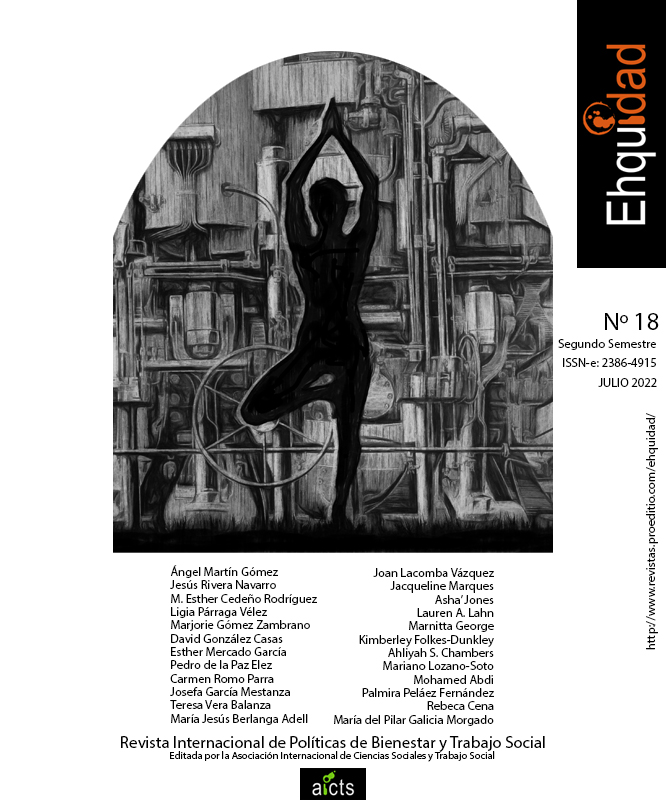Trends and challenges in social work. A view from the Portuguese reality
DOI:
https://doi.org/10.15257/ehquidad.2022.0016Keywords:
Social Work, Trends and challenges, Technification of social intervention, Politicisation of social intervention, Emancipatory social workAbstract
This article is a theoretical reflection on current trends in social work and the challenges in responding to each of them. Six trends are presented: the first describes the current overvaluation of the individual dimension to the detriment of the collective dimension, with the consequent moralisation of social problems; the 2nd explicitly states the change in the notion of law with the modification of law into law-obligation; the 3rd presents the transformation of rights into non-universal palliative actions, through the transfer of competences from the central state to the local state, the market and civil society; The 4th demonstrates the transformation of the universal character of rights through the targeting of social policies; the 5th exposes the trend towards the increasing instrumentalisation and technification of social work, which imposes an instrumental rationality and a secondaryisation of the relational function of the profession; the 6th trend is both a result and a cause of the others: the abandonment of the collective and political character. To address these trends, we present 14 challenges that seek to adopt a transformative vision of social work, based on a collective project that articulates all the dimensions of the profession and develops emancipatory actions that respect the intrinsic value of the dignity of all human beings, respect for diversity and the defence of human rights and social justice.
Downloads
References
Albuquerque, C. P. (2017). A reflexividade no quotidiano profissional dos Assistentes Sociais. En C. P. Albuquerque e A. C. Arcoverde (coord.). Serviço Social contemporâneo. Reflexividade e estratégia. (pp. 23-46). Pactor.
Amaro, M. I. (2012). Urgências e Emergências do Serviço Social. Fundamentos da profissão na contemporaneidade. UCEditora.
Amaro M.I. (2014). Um Admirável mundo novo? Tecnologia e intervenção na contemporaneidade. En M. I. Carvalho y C. Pinto (coord.). Serviço Social. Teorias e Práticas. (pp. 97-112). Pactor
Behring, E.R. y Boschetti, I. (2007). Política Social: fundamentos e história. (2ª Ed). Cortez.
Bouquet, B. y Garcette, C. (2005). Assistante Sociale Aujourd’hui. Maloine.
Castel, R. (1998). As Metamorfoses da Questão Social: Uma Crónica do Salário. Ed. Vozes.
Castel, R. (2009). La montée des incertitudes: travail, protections, statut de l’individu. Ed. duSeuil.
Castel, R. (2012). Devir do Estado Providência e Trabalho Social. Locus Soci@al (4), 7-21. https://doi.org/10.34632/locussocial.2010.10163
Charlot, B. (1994). La territorialisation des politiques éducatives: une politique nationale. En B. Charlot (coord.). L’École et le Territoire: Nouveaux Espaces, Nouveaux Enjeux. (pp.27-48). Armand Colin.
Dominelli, L. (1998). Anti-Oppressive Practice in Contex. En R. Addams; L. Dominelli y M. Payne. Social Work: Themes, issues and critical debates. (pp. 3-22). Mac Millan Press.
Dominelli, L. (2004). Social work theory and practice for a changing profession. Polity Press.
Faleiros, V. P. (1999). Desafios do Serviço Social na era da globalização. Serviço Social & Sociedade, 20 (61), 153-187.
Faleiros, V. (2002). La Crítica a una política del sujeto. Trabajo Social, n.º 4, 62-82. https://revistas.unal.edu.co/index.php/tsocial/article/view/32517/32524
Healy, K. (2001). Trabajo Social. Perspectivas contemporáneas. Ediciones Morata, S.L.
Figueira-McDonough, J. (2007). The Welfare State and Social work: pursuing social justice. Sage.
Hespanha, P. (2008). Políticas sociais: novas abordagens, novos desafios. Revista de Ciências Sociais, v.39, n.1, 5-15. http://hdl.handle.net/10316/10865
Guerra, Y. (2012). A dimensão t écnico-operativa do exercício profissional. En C.M. Santos;D. Backx y Y. Guerra (orgs.). A dimensão técnico-operativa no Serviço Social: desafios contemporâneos (pp. 39-68). Editora UFJF.
Iamamoto, M. V. (2009). Serviço Social na cena contemporânea. En Conselho Federal de Serviço Social [CFSS] (org.) Serviço Social: Direitos Sociais e Competências Profissionais (pp. 15-50). https://www.abepss.org.br/ arquivos/anexos/o-servico-social-na-cena-contemporanea-201608060403 123057450.pdf
Iamamoto, M. V. (2011). Relações sociais e Serviço Social no Brasil. Esboço de uma interpretação histórico-metodológica. (33 ed). Cortez Editora.
IFWS, International Federation of Social Workers (2014, July). Global Definition of Social Work. https://www.ifsw.org/what-is-social-work/global-definition-of-social-work/
Ion, J. (2005). Le Travail Social à l’Épreuve du Territorie. Dunod.
Joaquim, C. (2015). Proteção social, terceiro setor e equipamentos sociais: Que modelo para Portugal. Cadernos do Observatório #3. https://www.ces.uc.pt/observatorios/crisalt/documentos/cadernos/CadernoObserv_III_fevereiro2015.pdf
Lipsky M. (1976). Towards a theory of street-level bureaucracy. In W. Hawley; M. Lipsky, Y (eds.). Theoretical Perspective on Urban Politics (pp.196-213). Prentice Hall.
Lodemel, I. y Trickey, H. (2001). An offer you can’t refuse – Workfare in International Perspective. Bristol University Press, Policy Press. https://doi.org/10.2307/j.ctt1t895rh
Marques, J. (2016). Itinerário de uma política: olhares sobre o rendimento social de inserção no concelho de Aveiro. [Tese de Doutoramento em Serviço Social. Instituto Superior de Serviço Social, Universidade Lusíada de Lisboa]. 336 p. http://repositorio.ulusiada.pt/handle/11067/2531
Marques, J. (2022). Análise da imagem do Serviço Social e dos Assistentes Sociais na imprensa escrita portuguesa. Revista Simbiótica (no prelo).
Montaño, C. (2003). Introducción. Hacia la construcción del Proyecto Ético-Político Profesional Crítico. En E. Borgianni, Y. Guerra y C. Montaño (orgs.). Serviço Social Crítico. Hacia la construcción del Proyecto Ético-Político Profesional. (pp.21-33). Cortez.
Paugam, S. (2003). Desqualificação Social: Ensaios sobre a nova pobreza. Colecção Educação e Trabalho Social n.º 6. Porto Editora.
Payne, M. (2002). Teoria do Trabalho Social Moderno. Quarteto.
Pedroso, P. (2010). Modelos de activação dos desempregados: Os desafios estruturais e as condicionantes conjunturais. Colecção Cogitum, n.º 37. GEP/MTSS.
Ruivo, F. (2000). O Estado Labiríntico. O Poder Relacional entre Poderes Local e Central em Portugal. Afrontamento.
Santos, B.V.S. (2005). A crítica da governação neoliberal: O Fórum Social Mundial como política e legalidade cosmopolita subalterna.
Revista Crítica de Ciências Sociais, 72, 7-44. http://www.boaventuradesousasantos.pt/ media/pdfs/governacao_neoliberal_RCCS72.PDF
Soulet, M. (2007). O Trabalho Social Paliativo: entre redução de risco e integração relativa. Cidades, Comunidades e Territórios, 15, 11-27. http://hdl.handle.net/10071/3448
Webb, S. (2001). Some considerations on the validity of evidence-based practice in social work. British Journal of Social Work 31(1), 57-79. https://doi.org/10.1093/bjsw/31.1.57
Webb, S. (2006). Social work in a risk society: social and political perspectives. Palgrave Macmillan
Yazbek, M. C. (2001). Pobreza e Exclusão Social: Expressões da Questão Social no Brasil. Temporalis, n.º 3, 33-40. https://ria.ufrn.br/123456789/838
Yazbek, M.C. (2003). El servicio Social como espacialización del trabjo colectivo. En E. Borgianni, Y. Guerra y C. Montaño (orgs.). Serviço Social Crítico. Hacia la construcción del Proyecto Ético-Político Profesional (pp37-69). Cortez.
Yazbek, M. C. (2018). Fundamentos históricos e teórico-metodológicos e as tendências contemporâneas no Serviço Social. En Y. Guerra, A. Lewgoy, C. Moljo, M. Serpa y J. Silva (orgs.). Serviço Social e seus fundamentos: conhecimento e crítica. (pp. 47-84). Editorial papel social.
Yazbek, M. C. (2018a). Serviço Social, Questão Social e Política Social em tempos de degradação do trabalho humano, sob o domínio do capital financeiro. Serviço Social em Revista, v.21, n. 1, 183-194. https://www.uel.br/revistas/uel/index.php/ssrevista/article/view/35215












